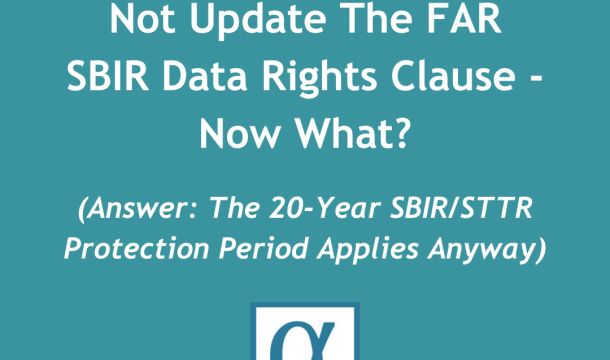The GovCon Bulletin™
New Federal Government Contracting Rules on Minimum Wages, Federal Taxes, Sexual Orientation Discrimination & More
December 16, 2015
Check Out Our New Web Site!
We have a new web site! As we mentioned in our last bulletin, we have streamlined the content that we offer to friends and clients in order to make the information more accessible across multiple viewing platforms. This process began earlier this year in the Spring when we re-introduced our bulletin with its new colors. We have carried these colors over to our new web site, which also is more accessible and responsive. Over the coming months we will introduce new content, including a videoblog, that we hope you find useful and informative. In the meantime, stop by our web site and look around!
In this edition of The GovCon Bulletin,™ we summarize a spate of interim and final rules issued on December 4, 2015, by the U.S. Department of Defense, the General Services Administration, and the National Aeronautics and Space Administration (referred to below as the Federal Agencies).
Mark Amadeo
December 4, 2015 saw a flurry of activity by the Federal Agencies, which issued on that day no less than six interim and final rules that touch on a wide spectrum of Federal contractor activity, from hiring and employment practices to Federal tax return filings. Indeed, the latter interim rule, which focuses on whether contractors are delinquent on filing tax returns or tax assessments, directly impacts eligibility to bid on contracts and receive contract awards. Contractors should, therefore, monitor closely the development of these rules and take necessary steps to comply with their requirements.
Final Rule - Federal Contractor Minimum Wage
The Federal Agencies adopted as final, with only minor changes, an interim rule issued a year ago on December 15, 2014, that established a new minimum wage for covered contracts - i.e., contracts containing the FAR clauses at 52.222-6, Construction Wage Rate Requirements, or 52.222-41, Service Contract Labor Standards. Specifically, the earlier interim rule and the recent final rule implement requirements under Department of Labor (DOL) regulations and under Executive Order (E.O.) 13658, dated February 12, 2014, mandating that contractors pay workers no less than the applicable E.O. minimum wage for all hours worked on or in connection with a covered contract. The interim rule required contractors and subcontractors on contracts and subcontracts awarded under solicitations issued on or after December 14, 2014, to pay a minimum hourly rate of $10.10 beginning January 1, 2015, and to adjust wages annually thereafter in accordance with the annual minimum wage rate determined by DOL.
Contractors also must include a minimum wage contract clause in covered subcontracts and must require covered subcontractors to include the substance of the clause in covered lower-tier contracts. Indeed, under the final rule, amended FAR clause 52.222-55 now states that a contractor is responsible for subcontractor compliance with the requirements and may be held liable for unpaid wages that are due to a subcontractor's workers.
Contractors may request price adjustments resulting from the E.O. minimum wage requirements and prices will be adjusted for any resulting increased labor costs, including subcontractor labor costs. Contractors, for their part, must consider any request by a subcontractor, including a small business subcontractor, for a subcontract price adjustment due to the annual minimum wage adjustment.
The final rule applies to all “workers,” as defined under FAR 22.1901, which generally includes anyone performing work on a covered contract regardless of the contractual relationship between the individual and his or her employer – i.e., regardless of whether the individual is classified as an independent contractor. The final rule does not, however, apply to individuals exempt from minimum wage requirements under the FLSA unless they are otherwise covered by the Construction Wage Rate Requirements or the Service Contract Labor Standards; the rule also does not apply to FLSA-covered workers not working directly on a contract. These are workers who perform duties necessary for the performance of the contract but who are not directly engaged in the specific work called by the contract and who spend less than 20 percent of their hours during a particular workweek performing in connection with the contract.
Final Rule - Prohibition on Discrimination on the Basis of Sexual Orientation and Gender Identity
A second final rule adopted, without change, an earlier interim rule that was published April 10, 2015, implementing E.O. 13672, which sets forth a uniform policy to prohibit discrimination in Federal procurement by adding sexual orientation and gender identity to the prohibited bases of discriminating in hiring and employment practices by Federal contractors and subcontractors. This final rule will apply to all contracts and subcontracts subject to FAR clause 52.222-26, which is required for all contracts over $10,000 that are not otherwise completely exempted.
Final Rule - Enhanced Whistleblower Protections
In another final rule, the Federal Agencies amended FAR to implement a statutory pilot program that enhances the whistleblower protections for contractor employees provided under FAR subpart 3.9. By way of background, in September 2013, DoD, GSA and NASA issued an interim rule to implement a four-year pilot program mandated by the National Defense Authorization Act (NDAA) to enhance whistleblower protections for contract employees. The elements of the pilot program are found in the NDAA. The interim rule and final rule now clarify that the pilot program, which applies to the majority of entities doing business with the government regardless of business size, is inapplicable to DoD, NASA, the Coast Guard, and any element of the intelligence community. DoD, NASA and the Coast Guard are covered by amendments to the NDAA that impose permanent requirements very similar to the temporary requirements of the pilot program.
Final Rule - Federal Government Agency Document Retention
The fourth final rule issued by the Federal Agencies concerns internal government housekeeping matters related to the government's retention of its contracting files. Specifically, the final rule updates the document retention period for Federal contracting files to conform with the retention period in the National Archive and Records Administration (NARA) General Records Schedule (GRS). Under the final rule, Federal agencies may require shorter retention periods for certain government contracting records upon approval from NARA.
Interim Rule - Representations & Certifications Regarding Federal Tax Matters
Representations
The Federal Agencies issued an interim rule that requires every offeror responding to a Federal solicitation to make a representation regarding whether the offeror has a delinquent tax liability or a felony conviction under Federal law. When an offeror provides an affirmative representation, the contracting officer is then required to request additional information from the offeror and notify the agency official responsible for initiating debarment or suspension action. The contracting officer cannot make an award to the company unless an agency suspending or debarring official has considered suspension or debarment and determined that this further action is not necessary to protect the interests of the government.
Certifications
This rule also adds a certification requirement regarding tax matters in solicitations for which the resultant contract (including options) may have a value greater than $5,000,000. Under that requirement, an offeror must certify that it has filed all required Federal tax returns in the preceding three years, has not been convicted of a criminal offense under the Internal Revenue Code, and has not more than 90 days prior to the certification been notified of any unpaid Federal tax assessment for which the liability remains unsatisfied, unless the assessment is the subject of an installment agreement or offer in compromise that has been approved by the Internal Revenue Service and is not in default, or the assessment is the subject of a non-frivolous administrative or judicial proceeding. When such a certification is required, a contracting officer shall not award any contract in an amount greater than $5,000,000, in the absence of an offeror's certifications.
The FAR Council and the Administrator for Federal Procurement Policy have determined that contracts for the acquisition of commercial items and acquisitions that do not exceed the simplified acquisition threshold should not be exempt from the interim rule's requirements. Comments are due February 2, 2016.
Interim Rule - Reporting on Veterans Employment
Lastly, the Federal Agencies issued an interim rule that amends FAR to implement a rule issued by DOL’s Veterans' Employment and Training Service (VETS) that, in turn, implements reporting requirements under the Vietnam Era Veterans' Readjustment Assistance Act (VEVRAA). VEVRAA requires Federal contractors and subcontractors to annually report on the total number of their employees who belong to the categories of veterans protected under VEVRAA, and the total number of those protected veterans who were hired during the period covered by the report. The VETS rule requires contractors and subcontractors to comply with its revised reporting requirements using the new Form VETS-4212, in lieu of the VETS-100 and VETS-100A. Contractors and subcontractors are required to comply with the new reporting requirements beginning with their annual report filed in 2015, which for some contractors and subcontractors is after September 30, 2015. The effective date of the interim rule is set as February 26, 2016, to allow the government to conform its procurement database. Comments are due February 2, 2016.



